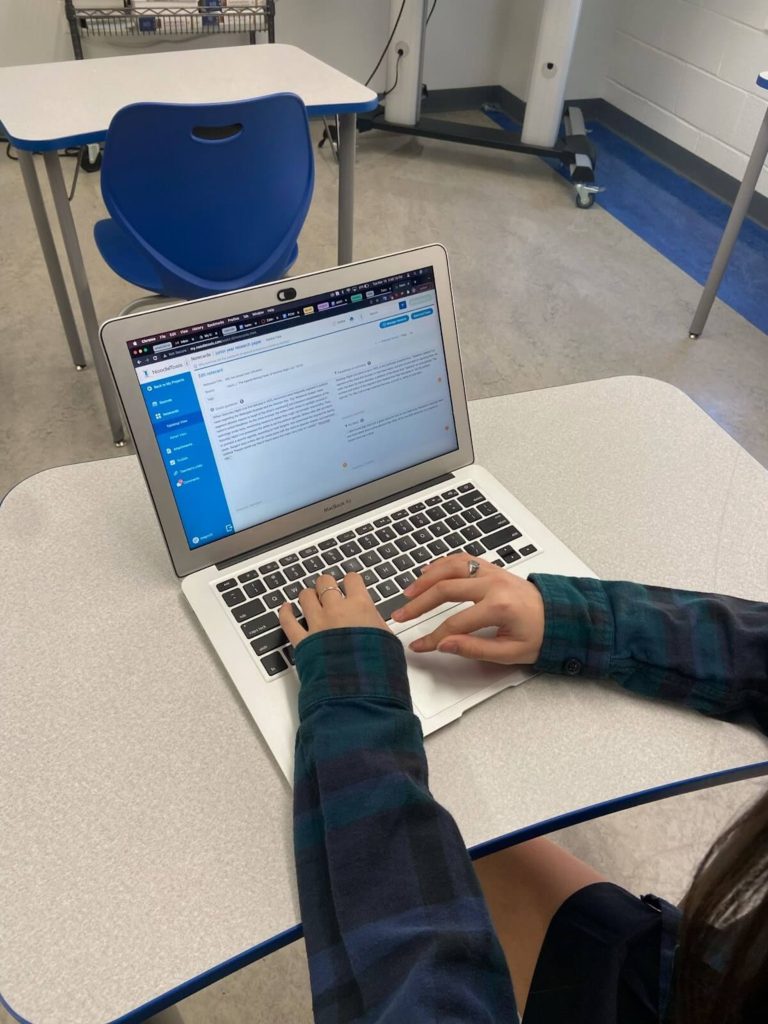Caroline Sewell ‘23 | Alexandra Gobran ‘23
Each EA student is required to write a history research paper throughout their time in Upper School. While many students resent the hard work and extensive hours which go into the process–developing a question, researching, creating notecards and an outline, and ultimately writing the paper–EA’s history term papers is a long-storied tradition aimed at helping students develop skills they will use in college and in life.
The challenges in crafting a research paper have been shared by EA students since at least the 1980s. Charles Bryant, Upper School History teacher, says, “Way back in the past–probably the 70s or the 80s–in second grade they did a thirty-page paper, in Middle School they did a ten-page paper and in Upper School they did nothing. Someone thought that was a really dumb idea, so they thought to change it. They lowered the Lower School projects and raised the Upper School projects.”
Since that time, the term paper, particularly the one designed for the U.S. History Students, has remained roughly constant. Bryant explains, “When I got here, it was a 1600-2400 word paper, we’ve upped it a little to 1800-2400 words, and it’s been that way since I got here in 1990.”
Steven Schuh, History Department Chair, explains the importance of the paper, commenting, “It is a critical part of academia, it teaches how to research, how to formulate questions, and how to utilize evidence to support an argument.”
Bryant outlines its premises, saying, “The research paper is based off of digging up factual evidence. It’s not an opinion paper, it’s a research paper. You are not figuring out what you want to write about and then looking for facts to support it, which is what most people do. You are having an investigative question, similar to the scientific method, and you are trying to figure out why something happened, and you are looking for the factual evidence, where the facts lead you.”
Michael Whalen, Upper School History teacher, adds, “It helps you understand evidence and arguments better, allowing you to make informed decisions.”
Despite these benefits, many students feel that the research paper is challenging. Anjali Malickel Ramakrishnan ‘24 says, “I find it very difficult and I don’t enjoy it.”
Maddie Dennis ‘22 agrees, commenting, “It was the most challenging thing I’ve had to do in my time at EA.”

Photo courtesy of Gianna Trala ‘23
Anika Agarwal ‘23, however, provides a more nuanced perspective, stating, “I think that, although the term paper itself can be very tedious and in the moment doesn’t feel like the best way to be spending your time, I do think that it will be helpful when it comes to being in college and writing term papers.”
For many students, the paper can feel like extra weight on top of an already large workload, especially in the spring as exams approach, and particularly in AP classes where the workload is even larger. Despite the extra work, Bryant feels that the paper is necessary to enhance the AP curriculum and provide a more well-rounded History class. He remarks, “The AP curriculum is good in its own right, but there’s a lot more to it, so obviously it’s for college preparation, but we live in a world where people believe that the alternative facts are just as viable as actual evidence-based facts.” He continues, “We in history believe that an evidence-based worldview is important, and looking up the evidence, researching it and thinking critically about it, and synthesizing, that’s an important skill of critical thinking–probably, the most important one you can get.”
The additional workload has also helped students learn time-management skills. Isabel Andrews ‘24 notes, “Writing history research papers has taught me to be a really diligent worker and to balance my time well.”
While students may not appreciate the paper now, the skills carry over into college, where they will benefit academically. Bryant explains, “There was an admissions video created about eight to ten years ago when EA went back and they interviewed recent Episcopal graduates about what their preparation for college was like, and virtually every one of them mentioned specifically the research paper that they did, which they did throughout High School, ninth and tenth grade as well, but especially the eleventh grade paper because it prepared them best for college and for the kind of critical thinking they were doing.”
Schuh concurs on the term paper’s preparation for the future, stating, “Most jobs you have are going to require you to make arguments one way or the other, and so learning how to do that in written fashion and in oral fashion is critical, and colleges continue to use research papers.”
He concludes, saying, “I think it is the most important thing we do, in all honesty. To be able to first of all, in terms of history, it’s really the work of historians, but it’s also the work of many other disciplines where you have questions and you need to understand the different perspectives surrounding that issue or question, you need to be able to understand which sources are credible in terms of answering that question.”